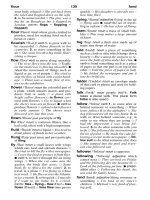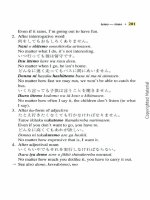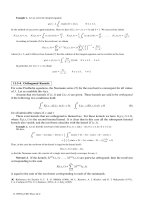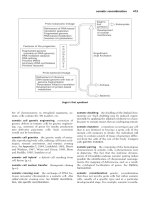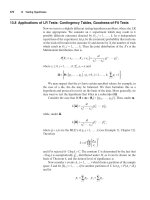Colloquial English Idioms phần 8 doc
Bạn đang xem bản rút gọn của tài liệu. Xem và tải ngay bản đầy đủ của tài liệu tại đây (187.72 KB, 13 trang )
For more material and information, please visit Tai
Lieu Du Hoc
at www.tailieuduhoc.org
A huddle is colloquial for a confidential discussion, and to
go into a huddle is to discuss privately.
Then the foreman said something about tackle, and
the two teams went into a huddle to discuss
it.
(C.
N.)
And I don't want a lot of so-called experts goin' into
a huddle and pulling me round in circles,
(A. C.)
to get together — to meet in friendly discussion; to confer
Look here, old man, we've got to get together again.
Soon. I can't get over it. (A. C.) Then we'll get
together and go through all this material and try to
make some sense of it. (M. W.) Let's get together on
this thing. (M. W.)
To put heads together is similarly used with the meaning to
consult together; to meet in friendly discussion; to deliberate.
You didn't put your heads together as to what you
would say to us? (J. G.) If we put our heads
together, we may find a so
lution.
(D. E. S.)
She added: "We've been putting our heads to-
gether." "Have you?" (C. S.)
to weigh (discuss) the pros and cons — to balance the
points in favour with those against
We must always weigh the pros and cons before
deciding whether to invest our money or to let it
stay in the bank. (W. B.) He's weighing up the pros
and cons. He's going to do the best for himself. (C.
S.)
An irrelevant topic in the discussion or conversation is said to
be beside the point.
There was a silence. Linnet controlled herself with
an effort and said in a cold voice: "All
102
For more material and information, please visit Tai
Lieu Du Hoc
at www.tailieuduhoc.org
this is quite beside the point!" "No, it is not beside
the point." (A. Chr.)
"Don't let's argue about that, Leo, " I said quietly.
"It's beside the point, anyhow." "No, it isn't, " he
cried. (J. P.)
Here is proverbial comment on advisability of consultation
and discussion:
Two heads are better than one. (Two persons in
consultation may find the right answer to a problem.)
To turn to Hilary was second nature with him —
and surely, in such a task two heads were better
than one! (J. G.)
TIME AND OPPORTUNITY
Time flies, how time flies, time does fly are colloquial
comments on the rapid flow of time. They often imply:
time passes quickly — so don't waste it.
Some colloquial phrases that express the idea of quickness
are:
in no time (in less than no time) — very soon; very
quickly
"You'll be sick of that in no time." I don't
think so." (J. G.)
There's a sergeant I was doing business with — he
promised he would have me out of jail in no
time.
(S. H.)
She was back in no time with a tray (A. C.) —
and then, in less than no time, off you drowse to
sleep — (S. L.)
103
For more material and information, please visit Tai
Lieu Du Hoc
at www.tailieuduhoc.org
before you can say Jack Robinson or before you know where
you are — very quickly, very soon, in no time
"Now you sit down, " she said, "and I'll make up the
bed before you can say Jack Robinson." (S. M.)
If I tell him you're our man you'll get a letter from
him before you can say Jack Robinson. (C. S) One
thing leads to another, and before you know where
you are you're mixed up with a lot of riff-raff and
you can't get rid of them. (S. M.) For God's sake,
hurry, Doctor. We'll have this roof down on us
before we know where we are.
(A. C.)
in a twink; in a twinkling; in the twinkling of an eye —
very quickly, in a moment
I'll be ready in a twink. The plumber repaired the
water-tap in the twinkling of an eye. (K. H.)
In a jiffy; in a second (in half a second); in half a mo;
in a
minute are similarly used, all meaning very soon; very
quickly.
Come up to my room and have a wash. Lunch'll
be ready in a jiffy. (J. G.)
Wait there, I'll be back in half a second. (A. W.)
"No objection at all, my boy. I'll just go through
the cash, lock up, and be with you in half-a-mo, "
said Mr. Claye (J. F.)
Show him into the study, please, and say I'll
be there in a minute. (J. G.)
"I'll bring you the other things in a minute, "
said the waitress. (J. G.)
Half a mo (moment) or half a minute usually means wait a
little time.
Johnson? Half a mo! Yes, the name is familiar
to me. (A. W.)
Now, then, we'll have a try at the door. Half
104
For more material and information, please visit Tai
Lieu Du Hoc
at www.tailieuduhoc.org
a moment, though, isn't there a door into Miss
Cynthia's room? (A. Chr.) "'scuse me half a minute,
Mrs. Owen, " exclaimed Ronnie's new client. (B. R.)
On the other hand a long time is colloquially expressed
by these phrases of exaggeration:
(for) donkey's years — a long time; (for) ages
Hello! I haven't seen you for donkey's years.
(A. W.)
"Isn't she working?"
"Well, no, she says, after working for donkey's
years as you might say, now she's married she's
going to take it easy. " (S. M.)
"Oh, I came to tell you Uncle is very anxious
for you to play something for him this evening, "
Dessy said suddenly. "Will you?"
"My dear, I haven't practised for donkey's years."
(V. L.)
till Doomsday or till Kingdom come — a long time; for ever
Go on! If you wait for me, you'll wait till Dooms
day. (A. W.)
"I haven't an opening. And I may not have one
for a year."
"I can wait a year."
"But I can't promise you one even then. I might
die or retire. If you wait for me, you may wait
till Doomsday." (L. A.)
"You could live up here till Kingdom come, "
he said to Moose, "and no one would ever find
out, particularly those dumb wardens." (J. Ald.)
A month (week) of Sundays is similarly used meaning a
long time or never.
It will take me a month of Sundays to do it.
(A. W.)
I've been with Mr. Gallagher for four years now
and a better gentleman you wouldn't find in
a week of Sundays. (S. M.)
He'll not learn to swim in a month of Sundays.
(W. B.)
105
For more material and information, please visit Tai
Lieu Du Hoc
at www.tailieuduhoc.org
Don't be half an hour means Don't be long about it
Go and put on your hat and don't be half an hour
about it. (A. W.)
Once in a blue moon is colloquial for rarely or never.
And the food's pretty rough. You know how these
peasants eat: macaroni on Sundays and meat once in
a blue moon. (S. M.) That only happens once in a
blue moon. (A. W.) He calls on me once in a blue
moon.
A lot of water has flown under the bridge since we last
met is a usual comment when you haven't seen people for a
long time.
Of things that in your opinion bear no more delay or should
have happened long ago you may say: it's high time (he
came); it's about time (we left). Note the form of the verb
in the following clauses, if there is one.
What! You have not learnt geography? Well, well,
it's high time you did. (A. W.) The general feeling is
that if we're not married it's high time we were. (S.
M.) It's about time you knew how to behave your-
self.
Note also these patterns with similar meaning:
and about time too.
and not before it's time.
"Come along, " he said. "We're" ready for you."
"About time too, " Connie answered and joined the
little queue that was going upstairs. (N. C.) So
you're ready? And not before it's time!
(Rather) late in the day is colloquial for at a late stage, very
late, especially unreasonably.
"What exactly do you want?"
"She deserted me. I want a divorce."
"Rather late in the day, isn't it?" (J. G.)
For more material and information, please visit Tai
Lieu Du Hoc
at www.tailieuduhoc.org
I am not going to begin to be polite now about old
Bounderby. It would be rather late in the day. (Ch.
D.)
"Consent?" thought Jolyon. "Rather late in the day
to ask for that." (J. G.)
How goes the enemy? is colloquial for What is the time?
One can kill time that is find ways of passing time without
being bored; busy oneself in some useless thing but so as to
make the time pass without tediousness.
"What have you been doing?" his mother used
to ask him when he came in late for dinner.
"Oh, hanging about just to kill time." Even at
the age of sixteen he had found it necessary to
kill time. (J. M.)
Look, let's not talk about atomic energy or the
problems and pleasures of marriage. Let's just
kill time. (M. W.)
As a matter of fact, you're not interested in sides,
you just want to kill time. (M. W.)
That would kill the night. We lords of the earth,
I reflected as I climbed into bed, are always
trying to kill time now — generally with a blunt
instrument. (J. P.)
To take one's time is not to be in a hurry, and the advice Take
your time means: Do not hurry.
"Sit down!" said Jolly. "Take your time! Think
it over well " " Take your time, " said Jolly
again; "I don't want to be unfair." (J. G.)
"I must say, Lewis, " he said, "the old boys are
taking their time." (C. S.)
Leave that to me, Mrs. Dudgeon; and take your
time. (B. S.)
The operator seemed to be taking his time. (S. H.)
"I don't know, " I answered. I took my time
to think. (S. M.)
The proverb Better late than never suggests that it is better to
arrive late than never to arrive at all, or be late in the
performance of anything rather than never do it. The
107
For more material and information, please visit Tai
Lieu Du Hoc
at www.tailieuduhoc.org
proverb is usually quoted to a person who has apologised or
being late. Another proverb derived from this one is: But
better never late. The idea of exactness is expressed in the
colloquial on the dot, that is, exactly on time, promptly.
We were to dine with the Greens at seven and we
reached their house on the dot. (S. M.) "We'll be
ready on the dot, " said Hetty. (V. L.) She says:
"Hello, pal. You're right on the dot. Let's go and
have a little drink." (P. Ch.)
To make good time is not to be late, or even to be ahead of
time (in advance).
Gorin has come ahead of time to get the lay of the
land. (M. W.)
When you are behind time (late) you may have to make up
for lost time, that is, to hurry in order to recover lost time.
"Quick, girls, " urged Mamma, "do up your father's
garters for him. Look sharp now, he's behind
time!" (A. C.)
He paused. "We've got a lot of work to do, "
he added, looking hard to Mr. Josser. "Making
up for lost time." (N. C.)
But I'll not rest till I've made it up to you.
Let's make up for lost time. (A. C.)
One can spend time or pass the time (use it up); waste
time (spend time uselessly) and lose time (let time pass
without turning it to account), but one should remember the
proverb: Lost time is never found again. A convenient or
favourable time (or occasion) is an opportunity and to
seize (grasp) an (the) opportunity means to see and
promptly make use of one.
Old Jolyon was not slow to seize the opportunity
this gave him. (J. G.)
Winterbourne seized the opportunity to put forward
one or two ideas he had been thinking over (R.
A.)
108
For more material and information, please visit Tai
Lieu Du Hoc
at www.tailieuduhoc.org
Seizing the opportunity may be also colloquially expressed in
these words of wisdom:
Strike while the iron's hot.
(Choose the best time for doing
anything, the time when circumstances are most favourable.)
"You see, " he heard Soames say, "we can't have it all
begin over again. There's a limit; we must strike while
the iron's hot."
(J. G.)
Never put off till tomorrow what you can do today
or
Do it
now.
(If you have any task to do, do it today; do not postpone
doing what you can do now.)
"Never put off till tomorrow, Charlie, what you can do
today, " said the man in the velveteen
coat. (H. W.)
Opportunity only knocks once
or
Opportunity seldom knocks
twice.
(If an opportunity is neglected, it may not come again for a
long time.)
"Opportunity only knocks once! Remember that, " cried
Gay.
(G. S.)
Blast Mr. Blaker. "Opportunity only knocks once, " he
told himself.
(N. C.)
Other proverbs in common use are:
Make hay while the sun shines.
(Make the best and earliest
use of your opportunities.)
Time and tide wait for no man.
(If an opportunity slips
away, it may not come again for a long time.)
To take (grasp) time by the forelock.
(To use an opportunity
as soon as it appears.)
109
For more
material and
information,
please visit Tai
Lieu Du Hoc
at
www.tailieuduho
c.org
WORK AND BUSINESS
Colloquial phrases concerned with work and business
include the following:
to be on the job — to be at work; to be working; especially
working well
Despite all Mrs. Josser's warnings, Mr. Josser was
back on the job again. (N. C.) Nobody knows his
business. Nobody knows how he spends his time.
Even when he's on the job, he disappears most of
each day soon as his work is done. (J. L.)
(to be) on the go — (to be) at work or doing something
active
I'll keep the car on the go about here till you
come. (B. Sh.)
I do my best. I'm on the go night and day.
(D. A. S.)
I've been on the go ever since daybreak. (H. W.)
to get down to (one's work, business, etc.) — to settle
down to it seriously
The holidays are over; we must get down to work
again. (A. H.)
He paused and then said in his ordinary everyday
voice: "Let's get down to it." (A. Chr.)
The Jossers were just having a cup of tea before
they got down to things. (N. C.)
to get on with work (job, etc.) — to advance in doing
it;
to progress with one's business
I couldn't back out on them even if I wanted to. And
I don't want to. However, let's get on with the work.
(M. W.)
For more material and information, please visit Tai
Lieu Du Hoc
at www.tailieuduhoc.org
"How are you getting on with my cousin's house?"
"It'll be finished in about a week." (J. G.) We've
had enough amusement and must get on with our
job. (J. P.)
The general idea of being (very) busy may be expressed by
the following phrase in common use:
to have one's hands full — to be very busy; to have as
much to do as one is able to do
When a man is so busily engaged that he cannot attempt
anything more, he is said to have his hands full.
My hands are full (or) I have my hands full.
(i. e. I am fully occupied.) (A. H.)
At the end of his visit, as Andrew stood, talking
to her at the door of her house, he remarked with
regret: "You have your hands full. It's a pity
you must keep Idris home from school." (A. C.)
"What if I ask Jack Burton to give you a hand?"
Roy told him. "Jack will do what he can "
"He's got his own hands full, " Sam said. (J. Ald.)
"Another thing is, " he goes on, "we've got our
hands pretty full." (P. Ch.)
Do not expect him to help you; he has his hands
full. (W. M.)
We have our hands full preparing the show.
(K. H.)
To have a lot of work on one's hands means the same
thing,
Shouldn't I look foolish to forgo a competent
adviser now that I've got a lot of work on my hands.
(B. R.)
To have (a lot) on also means to be very busy,
I've a lot on this week, but next week I shall
probably have more time to spare. (W. B.) Have you
anything on this afternoon? (i. e. Have you any
engagement? Are you free?) (A. H.)
111
For more material and information, please visit Tai
Lieu Du Hoc
at www.tailieuduhoc.org
Other phrases expressing the notion of being busy include
t
he following:
to be snowed under with work; not to have a
minute to spare; to be (hard) at it.
After so much inactivity it's good to be hard at
it again. (W. B.)
If well-behaved they even on occasion served
as house-boys. Cooper kept them hard at it.
He liked to see them work. (S. M.)
I wish I could help you with the Garden Party,
but I really haven't a minute to spare. (W. B.)
I'm snowed under with work this week, but next
week I'll probably have more time.
(to have) other fish to fry — (to have) other business to do
(and therefore be busy)
No; I can't go now. I've got other fish to fry. If you
can see through this mystery, it's more than I can.
I'm beaten, and I confess it. In any case I've other
fish to fry. (A. Chr.) What did you mean by saying
you had other fish to fry, Sir Charles? (A. Chr.)
A common simile describing a busy person is: as busy as
a bee.
She had no sooner done this, than off she was again;
and there she stood once more, as brisk and busy as
a bee (Ch. D.)
A busy person may protest (against some additional work,
et
c.) in the following words:
I have only one pair of hands.
"Can't you look after yourselves for once? I've only
got one pair of hands, you know, " said their
harassed mother. (W. B.)
The idea of working too hard is expressed in the following
ph
rases:
to burn the candle at both ends —
to work too ha
rd;
use all one's energy; stay up late and get up early
"I'm worried about you, " she said.
"What's the matter?"
"You mustn't burn the candle at both ends, "
(C. S.)
For more material and information, please visit Tai
Lieu Du Hoc
at www.tailieuduhoc.org
to overdo it — to make oneself too tired by working too hard
"Mind you don't go overdoing it now you are
here, " he remarked at last, as though Mr. Josser's
return had been his own idea entirely. "Take
it easy, remember no late hours." (N. C.)
"And if I might suggest, Miss Dinny, a little sea
air for you."
"Yes, Blore, I was thinking of it."
"I'm glad, miss; one overdoes it at this time of
the year." (J. G.)
Other phrases connected with the idea of much work include
the following:
to work one's fingers to the bone
— to work
very hard
I intend to go at my profession in earnest, and work
my fingers to the bone. (B. Sh.) In the cotton-mills
young girls and women worked their fingers to the
bone. (K. H.)
to put one's back into something —
to work very hard
at it
"That's why I'd rather else tackled her Firstly, " he
smiled ruefully, "I shall be accused of not putting
my back into the job, and secondly — well — she's
a friend — you understand?" (A. Chr.)
to keep one's nose to the grindstone —
to work hard and
labouriously
John wants to take the doctor's degree; he has to
keep his nose to the grindstone. (K. H.)
to have one's work cut out (for one) —
to have as much
work
as one can do; to have a difficult task
It's a big job, he'll have his work cut out for him.
(A. H.)
I expect to have my work cut out for me. I shall act
and I shall act promptly. (S. M.) "Huph!" said
Soames. "Commisions! You'll have your work cut
out, if you begin that sort of thing!" (J. G.)
113
For more material and information, please visit Tai
Lieu Du Hoc
at www.tailieuduhoc.org
"Mrs. Nunro is a great friend of mine. She's been
kindness itself to me. I won't hear a word said
against her." "Then I'm afraid you'll have your job
cut out for you if you stay here much longer." (S.
At.)
Getting over the hard, preliminary work may be colloquially
put in this way: to break the back (the neck) of a thing
(job, etc.) —
to have disposed of the main part of the task
We have broken the back of it; what remains
to be done is easy. (K. H.)
In an hour's time we shall have broken the back
of the job. (W. B.)
This has been a big job but I have broken the
back of it now. (Eck.)
Other common phrases dealing with work are: to sack a
person — to dismiss him from work to get (be given) the
sack — to be dismissed from a job
As a matter of fact, I hadn't thought they would
want to sack me, but — (B. R.) We'll wait three
months — to make sure you don't get the sack —
and then — (A. Chr.) He's just given me the sack;
and I have four children looking to me for their
bread. (B. Sh.) For the last five years he's been in the
City in a stuffy office. And now they're cutting
down and he's got the sack. (A. Chr.)
To get (be given) one's cards means the same thing.
If the men don't return by tomorrow they'll get their
cards. (W. B.)
to be kicked out — to be thrown out; to be dismissed with
contempt
"Did Almond play?" asked Kenning. "You bet your
life he didn't, " said Walton. "They kicked him out
of the team last season." (S. M.)
114


